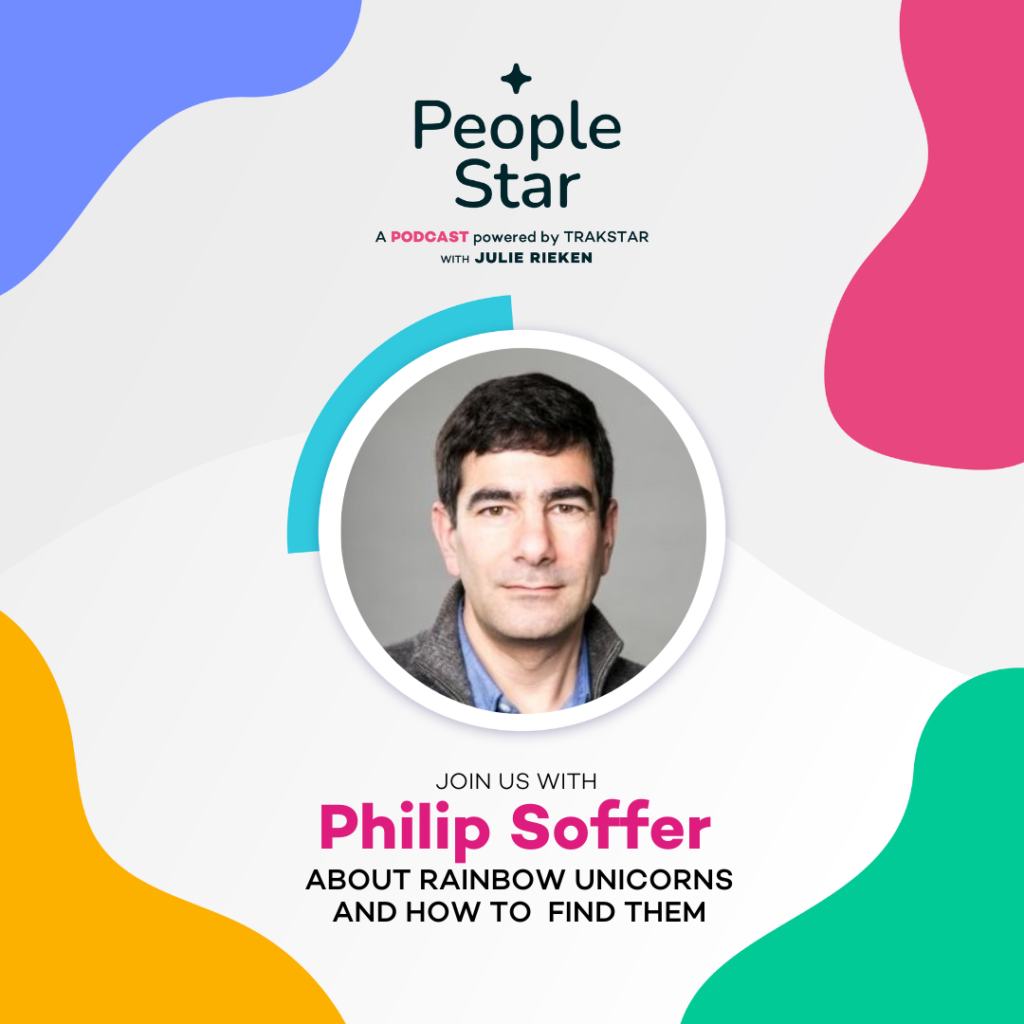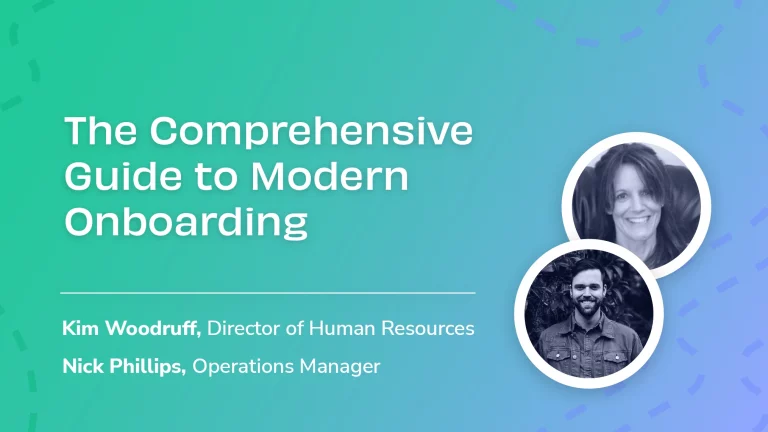PeopleStar Podcast_Phil Soffer: this mp3 audio file was automatically transcribed by Sonix with the best speech-to-text algorithms. This transcript may contain errors.
PeopleStar Podcast Intro:
Welcome to the PeopleStar podcast. We deliver leadership perspectives from industry experts on their people, architecture, routines, and culture as they solve HR's newest challenges. And now your host, Julie Rieken.
Julie Rieken:
Hi, I'm Julie Rieken, host of the PeopleStart podcast, and I'm super excited to have with me today Phil Soffer. Phil and I know one another from working at portfolio companies under the Turn/River umbrella, and we met each other years ago. And we've had so many great conversations about leadership and people over time that I thought it would be very interesting to talk with Phil about his experiences and get some ideas from Phil about how he manages people and some of his experiences in the workplace. So, Phil, welcome to the podcast!
Phil Soffer:
Thank you, Julie. It is so great to be here and so great to see you!
Julie Rieken:
That's awesome. Phil, would you tell us just a little bit about what you're doing today and a little bit about your work, and then we'll dive into some stories that you might have about leading and people?
Phil Soffer:
Absolutely! So I am the VP of Product-Service Systems at EPAM, which is a global product development consultancy. I got here by way of the acquisition of test IO, where I was the CEO, and that was the portfolio company that is and was in Turn/River. So I have about 20-something years in Silicon Valley and the Internet. I have run lots of different parts of businesses, and now I've been a CEO and an acquired person. So, guess I've run the gamut.
Julie Rieken:
Phil, that's, that's a lot. You have a ton of great experiences starting in Silicon Valley, now with EPAM, going through acquisitions, all of those pieces. So I know you've got a ton of experience in leading and working with people. So I'm excited to ask you a couple of questions today about some stories that I think would be really helpful for people to hear from you. So let's just start with your leadership journey. Clearly, you've had some experiences here in leading companies through transitions, acquisition, sale processes, and all of that, I am so interested in what your superpower is as a leader. How do you manage all this? What's the strength that you bring to the game?
Phil Soffer:
So I think, my wife would say that my superpower as a person and as a leader is that I can find the good in almost anyone, even in people who themselves are not always clear on what their superpower is. I can find it. I can magnify it, I can exploit it. I can turn it into something that makes them productive members of the team. I don't think that means that I never have any problems with anyone's performance. That's not true. But I think I have been fairly successful over time at finding young and talented people or sometimes older and talented people and getting more out of them than, than they thought possible. And that's, that's a little bit of a superpower, I think.
Julie Rieken:
I definitely agree! And I see that in you for sure. You definitely have that ability to bring optimism and pull that out of people. Do you have any specific examples of when you might have been able to help somebody find their strength?
Phil Soffer:
Oh, gosh. I mean, so many. Let me just let me mention a couple. And so I've managed people who were extraordinarily more successful than I am and have surpassed me in every conceivable way. And I like to think because maybe in my ego needs me to think that I had something to do with that. And so, you know, one of the people that I'm thinking of is a guy who is just a savant product person. I mean, he's just, he just sees things so immediately and so crisply about what a product needs to do and what it can do and what it could do if you invested a little more in different ways. And he went on after he worked for me to eventually, like run product at YouTube and that kind of stuff. So he's had a billion users, which is, I guess, everyone's, everyone's dream in the world of product, right? And so when, when I found him, he had all of that, he really did. And he didn't need me to teach him really how to be a better product person. What he needed me to teach him was how to lead other people along, right, how to make people get along with one another toward the goal and how to make them feel like they were as bought into it as he was. And so, you know, eventually, he became so good at this that he was kind of teaching me how to do it. So I feel like that's one example of somebody who, you know, I found somebody who had a certain set of superpowers that were sufficient to make him amazing at his job. But I helped him find another set of superpowers that made him not just amazing at his job, but really like one of the very, very best. So I feel maybe, maybe I'm taking too much credit for that, but I feel pretty good about it.
Julie Rieken:
Your humility is duly noted. And I bet that the ways that you lead and model were really, really impactful to him in his journey, so that is a cool story. And then he went on to do things that were amazing with you and then amazing in the future. That's a cool story.
Phil Soffer:
Yeah, that was, that was a good one.
Julie Rieken:
Awesome. Here's another question for you. Let's just think about a piece of advice, this is a maybe a different track than the superpower as a leader, but I'm interested to know about any piece of advice recently that might be ringing in your head right now and why?
Phil Soffer:
So maybe the best piece of advice that I've gotten at work is it's better to be effective than to be right. And so I always have to have that advice in my head, because growing up, I put great store in being right, I always wanted to have the highest possible grade point average. I always wanted to do the best on any test. I always wanted to be able to argue anyone. And I tended to find myself or put myself in institutions where this sort of thing was called for and acceptable, and it made you successful. And the more I got into managing people and managing situations in corporate life, the less effective that was for me. And I found that my natural inclination toward wanting to be right was actually getting in my way. And so I had a manager/mentor who worked a lot with me, and he's just a genius for it. And you should interview him. He basically sat me down one day and he said, look, you're probably the smartest guy around, you know, which was obviously he's flattering me, right, like I, I can see all the moves that are being done on me, but that doesn't make them any less effective. He said, but, you know, it's not enough to be smart, it's not enough to be right, you have to, you have to be the one who's getting the results. And if you want to earn more money and get further in life and, you know, be a CEO one day, you have to learn that it doesn't matter whether you're right, nobody at the board level is going to care whether you are right. They're going to care whether you did or your organization did what they said they were going to do. And that's the thing that matters. And I have to keep reminding myself that because there are so many times I just want to be right. It's so easy to be right. But it's not usually the correct thing to do in most circumstances. So I hold that one close.
Julie Rieken:
That is a really interesting and super great piece of advice, being effective versus being right. Is there a time when you think about, OK, I got to bite my tongue? And what does it look like? How do you change what you're thinking? That's so hard!
Phil Soffer:
It is hard. It is hard. There is many, many, many times like that. There's a lot of times like that. I mean, you know, I'm, actually have really good relationships with my manager now. I'm not a manager outside of the board for a really long time. So now I have a manager and sometimes I just have to. I'll tell you when I have to do it, when I have to do it is, I sometimes want to say, as I said, you know, like that, that phrase.
Julie Rieken:
I love that!
Phil Soffer:
I feel like little, "I told you so" phrase. Yeah. Now I have to banish that one because it's just, you know, it's so counterproductive that there's just no point. So that's one thing that it looks like. With people that I am managing, it's much less prevalent in me because I've sort of, I've sort of adopt the teacher, teacher/mentor persona, and I try not to, I try not to tell people what to do. So, therefore, there's less of being right anymore for me, and more of like just trying to lead people where, you know, where they know to go and, you know, if they're going in a truly wrong path to be corrective. So that's not so hard, but is still is hard with managing up for me to curb my desire to be right.
Julie Rieken:
But you are right a lot, but it is hard sometimes right? Because to your point, I think you're going back to your superpower, being able to find the strengths in people. It's hard to find the strengths if you have the oppositional, well, you don't have this behavior. But if a person were to have the oppositional behavior of I'm right, it's hard to pull out somebody else's strength so that those two things seem to complement each other well.
Phil Soffer:
Well, and I think, to your point, I think I did grow into, you know, having a little bit, having the superpower. I'm not sure it was my management superpower when I started being a manager. I think it was sort of a personal superpower because like I remember I had a girlfriend who didn't want to meet my family because I had described them in such compelling ways that she was intimidated by them. So maybe I sort of had a little bit of the gene at the beginning, but I didn't, I didn't have it for people that I was managing or working with, and I think it did develop a sort of in parallel with my not needing to be right all the time.
Julie Rieken:
That's awesome. OK, let's go down one more track here, Phil, that I think would be, I'd really like to hear your perspective on this. When you think about and I'm thinking about this now in this COVID world, right, with people returning to the office, and how do we pursue new opportunities when we're not necessarily in-person and we could be distributed. And so this one seems to me, whether it's in an in-person situation or remote situation. This question to me, I'm kind of wondering how you think about it, some people in the workplace aggressively seek out new opportunities, and some equally talented people don't push as hard to seek out new opportunities. How do you deal with that as a leader? How do you find this? And I think this kind of goes back to you finding their strengths, but how do you deal with that?
Phil Soffer:
Yeah, that's a, that's a good question. And I think it's a really important one. Also, in the context of diversity, equity, and inclusion, because I think you will find that the people who are more aggressive at seeking out new opportunities tend to be, you know, maybe to the manner born, they tend to be maler, whiter, richer by background than the people who are less confident in their abilities and seek out opportunities less so, you know, first of all, I don't think you can treat everybody equally. I think you really do need to make it a principle to meet people where they are and help people get where they can be. And so I want people to feel that they are being equitably treated, but I don't treat everybody the same way. So I think that is one sort of principle. A second thing that I think is very important is to emphasize the getting out of your comfort zone, that it's a cultural value that I try to have everybody feel in the organization if they're working on my team, that they should feel uncomfortable and pushed a lot of the time. And the way I model this is I'm completely upfront about feeling imposter syndrome a lot of the time, because I personally I do, and I'm totally upfront about it. I'm totally upfront about when I feel a certain sense of discomfort with the situation that I'm in and the challenges I'm facing are the opportunities that are in front of me. And, you know, sometimes I say I feel a little bit of, a little bit of vertigo right now. So I really do try to model that behavior and tell people that it's, it's not only OK to feel discomfort with the scope of a project or an opportunity, it means it's good because it means that you actually are learning, you're actually pushing yourself in ways that are going to help you grow. And if you're not feeling that, then you're kind of coasting. And the only thing that coasts is something that's going downhill, right? So I think it's important for leaders, I would say, maybe especially leaders who are middle-aged white guys to let on that, yes, we also feel like impostors and we also feel scared. And the difference maybe between people who have had privileges and people who have had fewer privileges is that we just feel like, OK, well, there's a safety net if we fail. And that's why we can kind of take more risks. But I want everybody to feel I like risk-taking is scary, but it's also OK.
Julie Rieken:
It's awesome. Phil, this has been so interesting and it's been great to reconnect, number one. And I love hearing your leadership perspective, you have so much humility. I don't think there's an imposter. I mean, I know you feel like maybe there's an imposter syndrome, but I think that is probably also one of your superpowers is that humility and your ability to reflect. So this has been really helpful to hear your stories, and I've enjoyed it! This has been fun!
Phil Soffer:
Well, likewise. And I appreciate the opportunity to speak on your podcast. And I should tell your listeners that I have learned so much from you about how to manage people and how to manage situations, like, I feel like every time we sit down, you know, maybe one with the microphones turned off, I learn something that I just take with me, including like interview questions that I still use, however, many years later, so it's great to be on with you and I wish you all the best with this podcast!
Julie Rieken:
Thanks, Phil!
PeopleStar Podcast Outro:
Thanks for listening to the PeopleStar podcast. For the dhow notes, transcript, resources, and more ways to get a seat at the table, visit us at Trakstar.com/Podcast.
Sonix has many features that you’d love including world-class support, secure transcription and file storage, automated transcription, collaboration tools, and easily transcribe your Zoom meetings. Try Sonix for free today.




